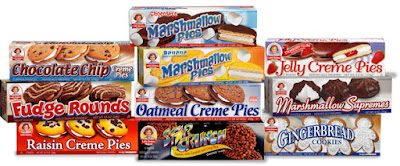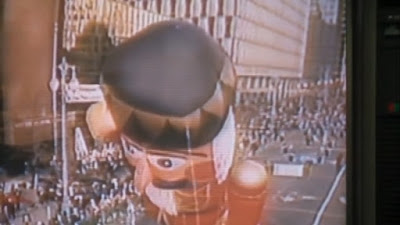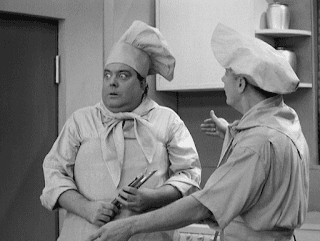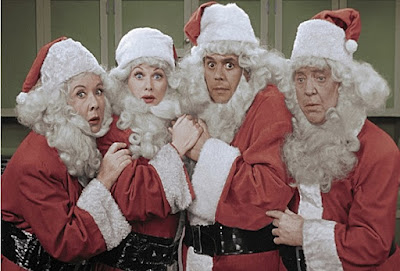My family was never big on The Golden Girls when I was young. We had pretty strict rules on television content in our house, and some of the Golden Girls jokes were too risque for us kids. Today, it's worlds tamer than anything your seven-year-old can find on their iPad in mere seconds. But back then, in a world where people launched a crusade against The Simpsons for "ruining society," some adult topics in "Girls" were definitely not allowed. Plus, the show was geared towards an older female audience, and with two young boys in the house, it was just not something we were interested in.
Also, 5-year-old me just wouldn't have wanted to watch it when there were things like Ghostbusters or the New York Rangers on TV. My father also steered me towards classics of the 50s and 60s, like I Love Lucy and The Dick Van Dyke Show, as my many articles dedicated to Nick at Nite and The Block Party Summer can attest. Check out the "Collections" tab for more.
In any event, it wasn't until over a decade after the show went off the air that I began to watch the Golden Girls from my dorm room in college. Until I moved off campus, I lived in a tiny single-student room no bigger than a small walk-in closet. I spent most of my time in that room seated at my desk in front of my laptop, but just a few inches to my right was a nice (for the time) 10-inch screen TV and VCR combo unit. Remember those all-in-ones? Anyway, I spent many a day watching TV and surfing the early days of the internet from that desk. I'd tape my favorite shows on VHS when I was in class, flying, or playing hockey.
One such show was The Golden Girls. I'd occasionally flip around the dial and find it on one of the "lesser" channels. I'd often stop and enjoy what I saw, every episode brand new to me. It quickly fell into what I like to call the "comfort food of TV" category. It was safe, mildly funny, reasonably predictable, and pleasant background noise.
During that time, my now-wife and I were flipping through channels on that tiny TV in my room one afternoon, and she stopped on The Golden Girls. She mentioned she had always watched the show, even as a little girl in the 80s and 90s. When I told her I had only started watching the show months ago, she told me that she had always had a television in her bedroom and would stay up late on Saturdays as a little girl to watch the Golden Girls.
Me? I didn't have a television in my bedroom until I came home from college on summer break and put my little 10-inch TV on my dresser. Later, I'd use up all of the space in my room with one of those giant, 50-pound box units with only a 24-inch screen that I salvaged from an aged relative who no longer needed it.
In any event, in college, my wife and I would watch the Golden Girls, and I slowly learned more and more about the characters. She always loved the later seasons, hat I preferred the earlier years. After getting married, we both discovered we like to fall asleep with the TV on, so every night was spent drifting off to comfort food television. On many nights, it's The Golden Girls.
For a good year or so, The Hallmark Channel had "The Girls" on as we would go to bed and again in the morning when we woke up. On my days off (mainly during the week), we'd lay in bed watching several episodes of The Girls, followed by Hart to Hart and Diagnosis Murder before she eventually had to get up and leave for work.
Eventually, one afternoon, I was in a hotel somewhere for work, probably around 2006 or 2007, when I stumbled across an episode of something called "The Golden Palace" on The Lifetime Channel. I watched an episode and immediately texted my wife. Did you know anything about this? She responded with something akin to "Yes, and it's terrible." I agreed based on what I saw that day, there was something deintely off about it. I spent the evening "binging" any episodes I could find on YouTube, anyway. It didn't have the same "feeling" as the original. I also didn't like the new characters. And I missed Dorothy.
Lifetime was apparently the only network ever to air The Palace because I never saw it come across Hallmark and Logo or TV Land. So, I watched what I could find and forgot about it.
Recently, I caught a few episodes on Hulu and found it wasn't as "bad" this time around. Perhaps it was the initial shock of finding out I had missed something? Maybe I just don't like change (true). I didn't like that there were new cast members or not all of the original characters. Perhaps it's just that there is nothing but garbage on television today in a world filled with terrible news everywhere, and I long for something that reminds me of the 1990s? Probably all of the above.
We spent this winter in Florida (and I'm totally ready for the retired-snowbird lifestyle), but throughout our time there, our little one did quite a bit of growing up. The "babyish" videos of music and repetitive situations have given way to more grown-up stories she can follow. We're also finding she wants less screen time these days and is playing with self-driven stories through arts and crafts or dolls and other toys. Long story short, we've won a little of our own TV time back. Even if it's just background static that we get to catch a few minutes of at a time, we've begun putting our favorites on TV during the day again. Like The Golden Girls, and it's glorious. Nothing cuter than when our 3-year-old asks, "Are we watching the Girls?" I can already tell that she's all four Girls rolled into one.
With the extra time we get to spend with "The Girls," I felt like no time was better than today to take a deeper look back at that often-forgotten sequel, The Golden Palace.
The Golden Palace was produced as a continuation sequel to The Golden Girls, which lasted as a single, 24-episode season. It ran on CBS from September 18, 1992, to May 7, 1993. It starred Betty White, Rue McClanahan, and Estelle Getty, who reprised their roles as Rose Nyland, Blanche Devereaux, and Sophia Petrillo (respectively). The series continued without the main character Dorothy Zbornak, played by Bea Arthur, who had decided to leave the series at the end of season seven.
Without Arthur's presence, the production team added two new characters, Roland Wilson, played by Don Cheadle, and Chuy Castillos, portrayed by Cheech Marin. A child actor, Billy L. Sullivan, was initially added to the cast but was eventually written out.
The series begins approximately two months (in story) after the original series had ended. Dorothy has just married Lucas (Leslie Nielsen) and moved to Atlanta, leaving her remaining housemates to figure out their futures. The three have decided to sell the home and invest in The Golden Palace, a failing but trendy Miami hotel that was up for sale. However, after the sale, the hotel is revealed to have been stripped of its staff to appear profitable to potential buyers. Only two employees remain: Roland Wilson (Don Cheadle), the hotel manager, and Chuy Castillos (Cheech Marin), the hotel's chef.
This, of course, requires the three gals to pitch in with the hotel duties as the bulk of the series focuses on their interaction with the staff and hotel guests. Celebrity guest stars and several returning characters from The Golden Girls were quite prevalent. Herb Edelman reprised his role several times as Stanley Zbornak, Harold Gould returned as Rose's love interest, Miles Webber, and Debra Engle appeared as Rebecca Devereaux.
By the start of the seventh season of The Golden Girls, Bea Arthur had grown tired of her role as Dorothy Zbornak and notified producers that she had decided to not return for an eighth year. With that news, the production team got to work at the end of Season Seven, retitling and revamping the entire show as a new series.
Creator Susan Harris continued to serve as Executive Producer alongside the returning Paul Junger Witt and Tony Thomas. The trio admitted to mixed feelings about the new series but felt obligated to continue for the sake of the cast and crew. Tony Thomas once said, "We had been employing a lot of people, so to just pull the plug would have meant ending something that provided a very satisfying life for a lot of people."
Betty White was skeptical of the new series and claims the two others, McClanahan and Getty, had reservations but were pleasantly surprised. "To our great surprise, we had a ball. It came together much better than we thought," White said in a USA Today interview.
McClanahan preferred keeping the original series and plotlines and wanted to add a new, fourth roommate to replace Bea Arthur but claims producers quickly rejected her ideas.
The Golden Girls had aired on NBC for nearly eight years, but when it came time to negotiate for The Golden Palace, NBC Chief of Entertainment Warren Littlefield was hesitant. Given the declining ratings during Season Seven for "Girls" and the lack of Bea Arthur, he would only commit to a 13-episode half-season order for the 1992-93 season.
CBS quickly entered the picture, offering an entire 24-episode season to bring the franchise to their network. Witt, Thomas, and Harris preferred to stay with NBC and attempted to get Littlefield to improve his NBC deal. He refused, again citing the declining ratings of the previous series and the network's recent slate of shows aimed at a younger audience like Seinfeld and Mad About You. Soon-to-debut classics like Freinds and Frasier were on the horizon, and Littlefield didn't think a Golden Girls spinoff would mesh well.
The decision was easy to move the program to CBS, which promised to treat The Palace as its own show - separate from its past with The Golden Girls. However, this move likely prevented so many Golden Girls fans from seeing or knowing about this one-season series. This was an age before the internet was widely adopted, and if one missed one of the few brief advertisements, there was no way to look up any information related to their favorite programs.
Not only did the show change networks, but viewers had spent seven seasons watching The Golden Girls on Saturday nights, only for CBS to move the show to Fridays. CBS used The Golden Palace as one of four comedies on Friday evenings in an effort to combat ABC's extremely popular "TGIF" block of family programming. The series was paired with Major Dad, Designing Women, and Bob.
With Bea Arthur gone, the character dynamics changed. Rose quickly became the jack-of-all-trades for the hotel. Rose's willpower and drive were so much stronger in some episodes than in the previous series that even Bea Arrthur's Dorothy, who returned for a two-part storyline, noted, "When did she become the strong one?"
Blanche would suddenly gain excellent business acumen and become the principal operator of the hotel. Her trademark traits from Golden Girls, vanity and promiscuity, were toned down for much of The Golden Palace. She did retain her southern charm and generally happy demeanor, which helped her interact well with most of the hotel's guests.
Sixty-nine-year-old Estelle Getty always portrayed an older Sophia Petrillo, but for Palace, her character was aged several years from Golden Girls. At 87, Sophia became the hotel's second chef, waitress, and dishwasher.
Don Cheadle had his first starring role in a television series on The Golden Palace as Roland Wilson, the hotel manager. Cheadle performed well as the comedic "straight man" to everyone else's antics. After Betty White's death, Cheadle posted a touching story on social media about how she treated him on set. He said the Director of Photography was giving him trouble in his scenes with Betty White due to lighting issues, given their vastly different complexions. One day, Betty White came in with slightly darker hair and makeup, all on her own accord, to reduce the color contrast between herself and Cheadle, ensuring he would be adequately lit for the camera.
The hotel's chef, Chuy, was initially intended to be a role for British comic Alexei Sayle, who would have portrayed the character as Eastern European instead of Mexican descent. Marin replaced Sayle before the pilot episode was shot, as the idea of having a Latino chef as a comic foil had been proposed before the original series even began. In fact, the first episode of The Golden Girls" was written with a live-in housekeeper and chef, Coco (Charles Levin,) but was eventually written out for several reasons, including the popularity of Estelle Getty's addition to the show as Sophia. Marin had been looking to branch out into television to escape his typecast as a weed-head. He also later claimed that, in order to get him to join the show, he was promised a spinoff series for his chef character in the event that The Golden Palace was a success.
Billy L. Sullivan appeared as Oliver Webb in the first six episodes. Oliver was Roland's foster child and would also appear in two later episodes, numbers 11 and 14, before being written off the show when his birth mother retook custody of him.
A story made the rounds for years that Estelle Getty would continuously need to reshoot her scenes on The Golden Girls, as she was beginning to develop dementia and couldn't remember her lines. Rue McClanahan noted after "Palace" ended that this was not the case on The Golden Palace. This led to speculation that Bea Arthur may have unintentionally intimidated Estelle Getty during The Golden Girls.
The theme song to The Golden Girls, "Thank You For Being a Friend," written by Andrew Gold, is just as iconic as the show itself, if not more famous. For "Girls," the song was covered by Cynthia Fee, who, thanks to Golden Girls, is probably most closely associated with the song despite its numerous versions. When The Golden Palace debuted, producers decided to keep the same theme song but update it for the 1990s. This version was covered by Chuck Negron, and the musical beats were given a bit of an early 90s R&B flare.
The exterior shots of The Golden Palace were taken of The Carlyle Hotel on Ocean Drive in Miami Beach. The series itself was shot at the Ren-Mar Studios in Hollywood.
Initially, the ratings for the show were quite solid, and the critics loved The Golden Palace. Los Angeles Times critic Rick Du Brow stated that producers "deserve plenty of credit for infusing the premiere of the tired old series with new verve, drive, and wit in its resuscitated form." The Orlando Sentinel wrote that the premise "seemed like one of the worst ideas of the year, but the premiere episode crackles with the same energy that marked the early years of The Golden Girls. The change of scenery, plus fresh chemistry created by the addition of new characters, relieves the numbing sense of deja vu that settled over the characters (...in the final seasons of the previous series)."
The show won its timeslot for the first several weeks, but viewership fell steadily as the season progressed. As the series went on, critics began to turn sour. John O'Connor of The New York Times wrote, "It's all a bit too familiar, and the format is forced into some unseemly stretching." Tom Shales at the Washington Post gave a mixed review but heaped praise on Betty White, saying, "She seems faster and fresher than ever. Arthur's absence is felt, but without Betty White, this is one show that clearly could not go on."
The show was never anywhere near as popular as its predecessor for multiple reasons. The absence of Bea Arthur as a regular cast member is often the most cited by fans, myself included. On Friday, the Golden Palace's new timeslot was opposite the popular Steve Urkel and Family Matters on ABC. The original series, despite still being quite popular, had been slipping in the ratings for a while anyway. The show had fallen to number 30 in the Nielsens during its final season, and viewers' habits had already begun to change away from the franchise. It was no longer a "must-see" for many viewers, and when it switched networks and day-of-week timeslots, it was out of sight, out of mind.
All of these factors worked against The Golden Palace, and the show ended far back at number 57 in the Nielsen ratings for the 92-93 season. CBS greenlit a second season, but the night before the upfronts, where networks announce the next season's lineup, CBS executives changed course and canceled The Golden Palace.
In fact, they canceled the entire Friday night block of programming, except for Newhart's "Bob." After the cancellation of Golden Palace, Betty White joined the new cast of Bob, where she rejoined old friend and co-star Bob Newhart on his show about an old comic book creator (Newhart) turned greeting card writer. When White joined the show during the second season, the network had just reworked the series in an attempt to bolster the ratings. Most of the original cast had been let go, and the premise of the series had changed. Unfortunately for White (and Bob), the show only lasted 8 episodes into the second season before being pulled from the airwaves.
Estelle Getty continued to portray Sophia Petrillo in Seasons Six and Seven of another Golden Girls spinoff, "Empty Nest." On Nest, she returned to the rebuilt Shady Pines retirement home (which she may or may not have set fire to during The Golden Girls) and would continue to "pop in" on The Weston family.
Series creators never said what officially became of Rose, Blanche, Roland, or Chuy at the hotel.
The syndication rights of the series are owned by Disney-ABC Television, although the series was never syndicated as a stand-alone series. Lifetime purchased the rights to air The Golden Girls during the mid-2000s, from approximately 2005 to 2008, and with that came the rights to air The Golden Palace selectively. Lifetime Network would air The Golden Palace as somewhat of an 8th season to The Golden Girls, often labeling the episodes as "Golden Girls" rather than "Golden Palace."
Since Lifetime was the only network to ever air the two shows together, the existence of this series is still not widely known. According to Rue McClanahan, most Golden Girls fans were unaware of its existence until it aired on Lifetime. She says the large amounts of press that the cancellation of the original series received overshadowed the news of a new show on a new network.
On January 17, 2022, on what would have been Betty White's 100th birthday, the streaming service Hulu added The Golden Palace to its platform. Many discovered The Golden Palace for the first time, creating a semi-viral buzz on social media when it was added to the platform. Many who remembered The Palace from its past days on television days uneasily rewatched the series. Many, such as myself, must have watched with less critical eyes because many former detractors truly enjoyed the show.
As of writing, The Golden Girls appears on The Hallmark Channel, TV Land, and some regional syndicated networks. The Golden Girls and The Golden Palace are available for streaming on Hulu.
Even though it doesn't have much of a following, I found The Golden Palace to be witty, full of great one-liners, comic timing, and pop culture references (of the era). The dirty jokes are even dirtier than the first go-round.
The Golden Palace isn't just "ok.' It's quite good and worth your time. Of course, it's totally nostalgic, and not every joke suits a "modern" taste, but you can't please everyone. Some episodes are better than others, even if they border on ridiculous, like when Sophia gets hired as a DJ at a local radio station to pull a cruel prank on Rose. I may not have liked the additions of Cheadle and Marin, but the chemistry between the three women is undeniable. Yes, even without Bea Arthur.









.png)





Comments